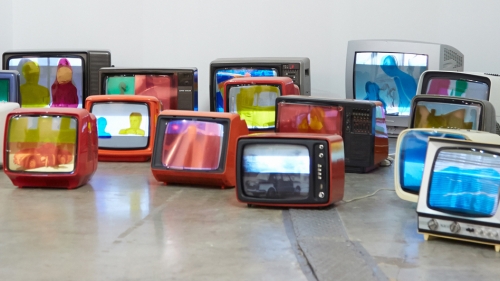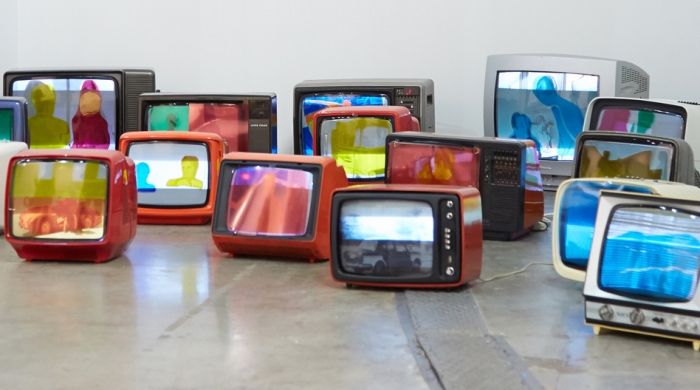
Undertaking the Honors Program in Media, Culture, and Communication is an exciting but demanding opportunity for students with outstanding academic records and a serious intellectual curiosity about the discipline. The program prepares and guides students to pursue original, independent research under the supervision of a full-time faculty member during the senior year. Producing an honors thesis is a challenging academic experience that can reap many benefits, including close mentorship from a faculty member, the opportunity to further explore a specific intellectual question or issue that piques your curiosity, and the development of strong research, writing, and critical thinking skills that can strengthen your portfolio in graduate school or professional settings. A program of this caliber often represents the most defining and culminating experience of one's undergraduate study and can synthesize the knowledge developed over the course of the major.
Timeline
Although the honors program demands the greatest amount of work during the senior year, planning should begin in the junior year.
Junior Year
- Consider if participation in this program is right for you. Talk to faculty members in the department about possible topics or senior honors work that past students have produced.
- Review journals and recent publications in the field to gain a deeper understanding of current trends.
- Identify possible questions that fascinate you enough to explore over a sustained period of research and writing.
April, Junior Year
- Submit an application to formally enroll in the honors program. Before submitting an application you will need to approach a faculty member with whom you'd like to work and discuss your research ideas. If the faculty member agrees to work with you, you must indicate their name on your application. You will be notified of your application approval or denial within 2 weeks after the deadline.
Summer between Junior/Senior Years
- Begin research based on input from your faculty sponsor.
Fall, Senior Year
- Enroll in Honors Seminar MCC-UE 1210 (2 credits). Taught by the Director of Undergraduate Studies, the Honors Seminar will take you through the initial steps of writing your thesis. With advisor approval, these credits can be applied toward elective requirements toward the MCC degree.
Spring, Senior Year
- You will be enrolled in 2 credits of Independent Study with your faculty sponsor. With advisor approval, these credits can be applied toward elective requirements toward the MCC degree.
- Continue writing thesis and turn in full draft before Spring Break.
- Meet regularly throughout the term with faculty advisor. The instructor of the honors seminar and the faculty advisor will together evaluate the final honors thesis.
- Present research at spring Honors colloquium.
Frequently Asked Questions
Thesis Guide
The thesis is generally about 40 pages in length, consisting of a review of relevant literature, a discussion of your research topic and methods, and an analysis of your findings. Read the MCC Thesis Guide.
Who qualifies for the Honors program?
Students with a strong academic record, genuine intellectual curiosity, and the self-discipline and commitment to undertake a sustained research project should consider this program. The minimum GPA for participation is 3.75, although, on the strong recommendation of a faculty member, a student whose GPA is slightly lower may be accepted.
Why should I participate in this program?
Benefits include the opportunity to work closely with a faculty member on a regular basis which can help students at large universities to feel a closer connection to the department. Faculty advisors can also serve as references for you in future academic endeavors. Writing the thesis and undertaking sophisticated research can also develop your skills in the areas of problem solving, using libraries and other research venues, managing time and large projects, and further develop your oral and argumentation skills. You will produce a lengthy, sustained piece of academic writing that you can use as a writing sample for application to graduate school. Finally, producing a thesis can be fun when it involves delving into a topic or issue that fascinates and delights you.
Why should I not participate in this program?
The program is not for everyone. Remember, you will be a college senior, with the inevitable senioritis that affects everyone to a greater or lesser degree. You may also be involved in internships or eager to move into a new career, further distracting you from intensive and sometimes solitary research. Rest assured that graduate school is still an option for students not completing the honors program. And again, students can graduate with Latin honors based on GPA regardless of participation in this program. Only students eager to do research and write a thesis should join the honors program.
What kinds of topics have students researched in the past?
Some recent topics produced by our undergraduate honors students include: Masculinity and Latin American Soap Operas; Communist Blacklisting and Broadway; Social Media Surveillance of Refugees; Korean Media Regulation; The Art of Subtitles; and New Media Graffiti as Political Communication. You can also check out this YouTube Honors Channel of honors students’ short, end-of-year presentations.
How do I initiate this process?
After considering if this program is right for you, discuss your topic ideas with a member of the MCC faculty.
How do I select an advisor?
You must work with a full-time faculty member. MCC faculty members present a wide range of interests, from globalization and politics in the media to the study of gaming and consumer culture. Please consult these MCC Faculty Areas of Undergraduate Thesis Supervision Areas. Your advisor and the Director of Undergraduate Studies can also help you identify a faculty supervisor whose expertise best matches your interests.
How will honors fit in my program of study?
Honors can count toward specialization electives, or toward an appropriate field of study, based on your research topic. You will discuss this with your faculty supervisor and your academic advisor. Of course, it can also count toward unrestricted electives.
How is my work graded?
You will be given a grade for your performance in the fall honors seminar by the course director. You must receive at least a B+ in the fall seminar (MCC-UE 1210) to be approved for thesis writing in the spring. Your thesis itself will be jointly graded by your faculty supervisor and the course director, following set criteria. Students who receive a B+ or A- in both MCC-UE 1210 and MCC-UE 1000 will receive a designation of Honors on their transcripts; students who receive an A or A- in MCC-UE 1210 and an A in MCC-UE 1000 will receive a designation of High Honors. The department’s Outstanding Thesis Award is conferred upon theses of exceptional quality. NOTE: Participation in the honors program does not guarantee graduating with honors in the major, but because of the closely supervised nature of the program and the self-selection of students who enter it, most students who begin the program successfully complete it.
Sample Thesis Abstracts
Waterdrop (A Chinese Crowdfunding Platform) and Its Relationship With China's Pre-Existing Health Inequalities
Angie Gao, 2023
This thesis investigates the effects of the Chinese online crowdfunding platform Waterdrop on the country's healthcare system. Specifically, it argues that while Waterdrop offers a way for individuals to raise funds for medical treatment and can help address some of the shortcomings of China's health system, it also contributes to increased inequalities in resource allocation and undermines public trust. The popularity of medical crowdfunding platforms is on the rise, with heart-wrenching stories flooding social media, highlighting their crucial role. This thesis analyzes Waterdrop's psychologically manipulative designs and features, which may exacerbate existing inequalities and undermine public confidence in the healthcare system. Using polling, interviews, and a critical analysis of Waterdrop's operations and impact, this thesis offers a nuanced understanding of the potential risks and benefits of medical crowdfunding in China. Ultimately, it contributes to a broader conversation about the role of technology in healthcare access and equity.
Infrastructural Afro-Modernity with Chinese Transnational Capital: Narratives Surrounding the Kenyan Standard Gauge Railway
Jenny Zheng, 2020
The Kenyan Standard Gauge Railway(SGR) is a transnational infrastructure project financed by the Chinese government. Infrastructures serve as tools for material connection and narrative building. The new railway allowed new opportunities of storytelling. In fact, storytelling becomes a field of contestation between the states and the public in shaping how we define nations. Through comparative narrative studies, my thesis investigates the types of SGR stories told by the Chinese government, the Kenyan State and the Kenyan public. I seek to answer the question: how do these narrative infrastructures inform us about Afro-modernity and a global China?
Click, Skip, Share: How Streaming is Changing our Relationship with Music
Lily Crandall, 2020
The technological systems that constrain and enable the ways in which users discover music, how often they listen to it, and what other kinds of music they are led to explore, all have the potential to shape our felt connection to music. Grounded in a discussion of how music consumption in the United States has shifted between a private act and communal activity, this thesis examines how streaming services have altered music preferences and listening habits. Through analysis of interviews with ten streaming users, this research concludes that due to the intangibility of streaming compared to physical music formats, users desire the ability to project personal music taste onto a physical or digital object, which results in the popularity of customized listening statistics and data visualizations, and the resurgence of the analog music format. Although many aspects of streaming are reworked functions of consumption from other modes of listening, what is distinctly new is the ease of access to music, which emphasizes the need for curated playlists to organize the extensive catalog of music that users are presented with.
Emoji: The Language of the Digital Platform
Brooke Marine, 2015
The use of Emoji, a popular medium of expression consisting of Japanese emoticons, has quickly become a cultural phenomenon. One might notice that while the emoji many people have come to know and use may seem limited to the Apple product platform, emoji are seen everywhere, commodified and reproduced on a variety of platforms. How is it that emoji are simultaneously limited to one platform yet seemingly ubiquitous symbols, understood widely by many regardless of age, location, and other socially constructed boundaries? What are the visual cues signified by an emoji, and how might its meaning differ from person to person? Surely, most emoji may mean the same thing to many people who come from similar social backgrounds and experiences, but what about those communicating with one another in emoji, from different parts of the worlds and with different first languages? Emoji can be used as a storytelling device, an unspoken language that conveys human emotion from person to person. What role does the use of emoji outside of the digital realm play in the understanding of its meaning? This thesis explores the topic of emoji as a language of the digital platform.
Change the Channel: Quality Television Discourses and Cultural Hierarchy
Molly Salas, 2014
This thesis explores the ways that contemporary television criticism informs and shapes public perception of what Quality Television is and how these perceptions reflect dominant social forces and hegemonic structures, by way of its relationship to class, race, and gender. Through a thorough content analysis of every published piece of television criticism across three publications (The New Yorker, AV Club and USA Today) in the year 2013, I notice there are numerous common descriptors of quality television in terms of visual style, intertextual references that place shows within a hierarchy of other shows like it, and overall subject matter that tended to earn comparisons to “quality” or “prestige” dramas that have preceded those on currently on TV. This, along with TV critics’ ambivalence toward awards shows such as the Emmys or Golden Globes, and shifting viewing practices from live to on demand options, suggests a widening rift in the critical conversation between those shows that succeed in ratings performance and others that are reviewed with an elite viewing audience in mind. As such, the homogeneity of "quality television" tropes across many series, networks, and subjects minimizes space for diversity on screen to excel critically.

Media, Culture, and Communication
239 Greene Street, 8th floor
New York, NY 10003
212-998-5191 | contact

